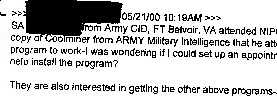|
|
|

|
Post September 11th -- New Challenges to Open
Government
September 11 transformed the national debate
over government secrecy and public accountability.
Government officials have removed public records
from the Internet, restricted access to public
documents, and attempted to hide the federal
government behind a wall of secrecy. In response,
EPIC has initiated
a series of FOIA requests for information on
proposals that will affect the freedom of
Americans, including records on national ID
systems, military use of biometrics for
identification, transportation profiling systems,
"trusted passenger" databases, and the deployment
of a surveillance camera network in the Nation's
Capital.
|
|
|
Documents Reveal More About FBI's Carnivore
System
Law enforcement agencies are now developing new
techniques to capture private communications on the
Internet. Documents obtained by EPIC under the FOIA
revealed that the US Army was also interested in
the use of "Carnivore," an Internet monitoring
system. Documents obtained earlier by EPIC
demonstrating that Carnivore was far broader than
announced led to a Congressional investigation.
|

|
|
|
|
 Documents
Reveal Efforts to Restrict Cyber Security
Information Documents
Reveal Efforts to Restrict Cyber Security
Information
|
|
Central to the future of Internet security is
the ability of the user community to assess the
effectiveness of policies pursued by the government
and the private sector. But some in government and
industry hope to keep such critical information
hidden from the public. In the summer of 2001 a law
student in EPIC's Internet Public Interest
Opportunities Program (IPIOP) obtained documents
which revealed that the head of a government
agency, the National Security Telecommunications
Advisory Committee (NSTAC), had lobbied for a
"cyber security" exemption to open government
disclosure laws. The Advisory Committee itself is a
source of many of the proposals that may be adopted
by the federal government.
|
|
|
EPIC Seeks Documents Relating to Doubleclick
Investigation
The Federal Trade Commission plays a central
role in safeguarding the privacy rights of American
consumers. But questions have been raised about the
effectiveness of the agency. After the FTC closed
its investigation of DoubleClick, a company which
had tried to profile Internet users, EPIC's FOIA
request led to the disclosure of documents that
provided insight into the Commission's
investigative process. Unfortunately, the FTC
continues to withhold a substantial amount of
material.
|

|
|
|
|
 Law
Enforcement Use of Private Sector Profiling Data Law
Enforcement Use of Private Sector Profiling Data
|
|
The Privacy Act of 1974 provides an essential
safeguard for American citizens and prevents the
creation of secret profiles. But in the last few
years Federal law enforcement agencies have spent
millions of taxpayers dollars to purchase databases
from information brokers and circumvent the Privacy
Act restrictions. These databases now provide
desktop access to the details on the private lives
of Americans. A FOIA request initiated by EPIC
provides the first insight into the scope of this
program.
|
|
|
NSA Surveillance Authority
When Congress passed the PATRIOT Act in
response to September 11 it significantly
expanded the use of the Foreign
Intelligence Surveillance Act for
electronic surveillance. These documents,
concerning NSA's interception of
communications and obtained by EPIC under
the FOIA, included an official
acknowledgement that "no NSA applications
have been rejected by the [Foreign
Intelligence Surveillance Court] in
the past 10 years."
|

|
|
|

|
Former Secrets - Documents Previously
Released Under FOIA
Public disclosure of this information improves
government oversight and accountability. It also
helps ensure that the public is fully informed
about the activities of government. For examples of
information and documents released pursuant to FOIA
requests, see EPIC's
Former Secrets Page and Cryptome.
|
|






